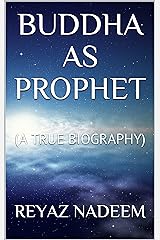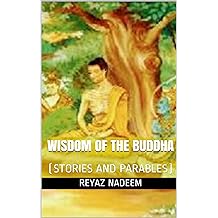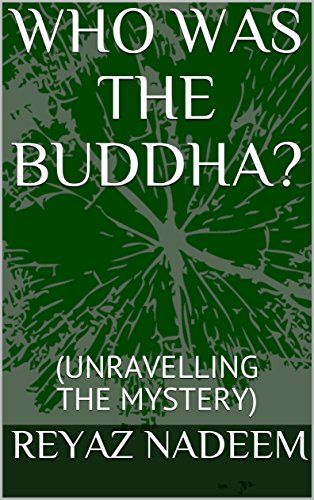Buddha in the Qur'an?
Yester-night I wanted to search for the similarities between the character and ways of Buddha and Muhammad. I found the following:

Reyaz Nadeem, Author
Answered April 29, 2018
"Forget the differences there are so many similarities between them that literally it can be easily proven that Prophet Muhammad was indeed a Buddha and Siddhartha Gautama a holy prophet.
SIMILARITIES:
- Both were gentle and preferred loneliness in the early stages of their life.
- Prior to their enlightenment both chose a secluded place for meditation.
- During their enlightenment both were visited by heavenly figures who encouraged them. (While Prophet Muhammad was visited by Archangel Gabriel whereas Gautama Buddha was visited by Brahma-Sahampati. It would not be surprising if both turn out to be the same.)
- After getting enlightened both started preaching the doctrine of truth.
- Both condemned the false rituals and practices prevalent in their time.
- Both performed miracles in order to prove their genuineness to the laity.
- Both were successful in having a following of their own.
According to Gautama Buddha, the following are the six criteria for identifying a Buddha:
(1) A Buddha attains supreme and perfect insight at night-time.
(2) On the occasion of his complete enlightenment he looks exceedingly bright.
(3) A Buddha dies a natural death.
(4) He dies at night-time.
(5) He looks exceedingly bright before his death.
(6) After his death a Buddha ceases to exist on earth.
Let us see how the above six criteria fit in the life of Prophet Muhammad.
(1) Muhammad (pbuh) attained supreme insight and prophethood at night-time.
And this can be understood by the following verse of the holy Qur’an:
‘We have indeed revealed this (Message) in the Night of Power’. (97:1)
(2) Muhammad (pbuh) instantly felt his understanding illumined with celestial light.
(3) Muhammad (pbuh) died a natural death.
(4) He expired at late night just before dawn.
(5) According to Anas (r.a.), Prophet Muhammad looked exceedingly bright on the night of his death.
(6) After the burial of Prophet Muhammad he was never seen again in his bodily form on this earth.
Thus, one can clearly see that all the six criteria mentioned by Gautama Buddha for identifying a Buddha had been completely fulfilled by the personality of Prophet Muhammad.
After the creation of the order of nuns Gautama Buddha had told Ananda thus:
“Ananda, if women had not obtained the going forth from the house life into homelessness in the Dharma and Discipline declared by the Perfect One, the holy life would have lasted long, the holy life would have lasted a thousand years.
But now, since women have obtained it, the holy life will not last long, the holy life will last only five hundred years.”
(The Life of the Buddha by Bhikkhu Nanamoli, p. 106)
There are two important prophecies indicated by the above statement of Gautama Buddha. Firstly, the purity of his teachings has been lost since the beginning of the first century CE and, therefore, the so called Buddhists no longer lead a holy life. Secondly, it indicates the arising of Maitreya Buddha in the sixth century CE as the holy life was supposed to last for thousand years if the order of nuns was not created.
Regarding Maitreya Buddha, Gautama Buddha had prophesied thus:
“There will arise in the world, a Buddha named Maitreya, a holy one, a supreme one, an enlightened one, endowed with wisdom in conduct, auspicious, knowing the universe.
What he has realized by his own supernatural knowledge he will publish to this universe. He will preach his own religion, glorious in its origin, glorious at its climax, glorious at the goal, in the spirit and the letter. He will proclaim a religious life wholly perfect and thoroughly pure; even as I now preach my religion and a like life do proclaim. He will keep up the society of monks numbering many thousands, even as I now keep up a society of monks numbering many hundreds.”
(Chakkavatti Sinhnad Suttanta D.III, p.76)
The Sanskrit word ‘Maitreya’ or its equivalent in Pali, ‘Metteya’ means ‘loving, compassionate, merciful and benevolent’. It also means kindness, friendliness, sympathy, etc. One Arabic word which is equivalent to all these words is ‘Rahmat’. The Arabic-English lexicon by Lane gives the definition of “Rahmat” as “mercy, pity, compassion, tenderness of heart, inclination requiring the exercise of favour and beneficence; pardon and forgiveness.”
The last of all the prophets was Muhammad (peace be upon him) who came near about thousand years after the passing away of Gautama Buddha. The word ‘Muhammad’ is also spelt as ‘Mahamet’ or ‘Mahomet’ and in various other ways in different languages. ‘Mahamet’ or ‘Mahomet’ is comprised of ‘Maha’ and ‘Metta’. The word “Maha” in Sanskrit and Pali means “Great and Illustrious” while “Metta” means “Mercy”. Therefore ‘Mahamet’ or ‘Mahomet’ means ‘Great Mercy’.
Regarding Prophet Muhammad, Allah – the Almighty God says in the Holy Qur’an:
‘And We have sent you not [O Muhammad], but as a Mercy for all creatures.’
(21:107)
In his prophethood days Muhammad (peace be upon him), in fact, was called the ‘Merciful’ which is ‘Maitreya’ in Sanskrit.
According to Gautama Buddha, all the Buddhas of past and future had or will have two foremost disciples and one servitor. It is a well-known fact that Prophet Muhammad had two foremost disciples and one servitor. The comparison is as follows:
Prophet (Buddha) - Two foremost disciples - Servitor
1) Siddhartha (Gautama) - Upatissa and Kolita - Ananda
2) Muhammad (Maitreya) - Abu Bakr and Umar - Anas
And Muhammad (pbuh) did keep a society of monks numbering many thousands. At the time of his death there were over one lakh of his companions/disciples.
Now, after examining all the above mentioned facts it can be safely concluded that Prophet Muhammad was indeed the much awaited Maitreya Buddha.
In Buddhist texts there are also mentioned some other things like during the time of Maitreya Buddha human beings will live for 80,000 years, women will marry at the age of 500 years, etc. These things just lack common sense and were mere interpolations which can be termed as nonsensical just to confuse a reader.
DIFFERENCES:
The main difference lies in the compilation of their teachings which makes one believe that Gautama Buddha was an atheist. But that is not so as nobody knows for sure the exact teachings of Gautama Buddha.
While the teachings of Prophet Muhammad are in pure form complied as ‘Authentic Hadith’ whereas the teachings of Gautama Buddha lies in corrupted form.
As regards the authenticity of the Buddhist texts, most scholars argue that they are not in the original pure form as the majority of these texts were written more or less five hundred years after Gautama Buddha’s passing away. These texts were corrupted with ideas [like rebirth, temporary state of God, etc.] from Hinduism and Jainism.
Books, Biography, Blog, Audiobooks, Kindle
https://www.quora.com/What-are-the-...nces-between-Lord-Buddha-and-Prophet-Muhammad
"For many centuries it has been baffling for the scholars, especially for those holding a theistic view, that how could a person like Gautama Buddha deliver pearls of wisdom without being enlightened by the Almighty God. Was he really like that as the Buddhist commentators portray him to be? Was he an atheist? Were his teachings exactly like that as mentioned in the Buddhist texts compiled hundreds of years after his passing?'"
OOOOOOOOOOOOO
Isn't it intriguing, please? Right, please?
Regards




